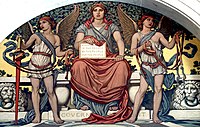
Photo from wikipedia
Making sense of the Chinese policy process has been one of the most challenging endeavors for China scholars since the beginning of ‘reform and opening up’. Although a great deal… Click to show full abstract
Making sense of the Chinese policy process has been one of the most challenging endeavors for China scholars since the beginning of ‘reform and opening up’. Although a great deal of empirical knowledge has been gathered over the years on policy-making and implementation in many different fields, theorizing on the Chinese policy process has mostly been concerned with individual policy instruments or various modes of policy-making so far instead of looking at how these are interconnected. In this article, we propose ‘political steering theory’ as an integrative theoretical framework to fill in this gap. Originating from policy research conducted by German social scientists starting in the 1970s, we consider ‘political steering theory’ to be the most appropriate approach to the Chinese case, particularly in the current era of ‘top-level design’ led by Xi Jinping. We demonstrate how China recently recalibrated its political steering approach and propose new directions for research into the Chinese policy process under the current administration.
Journal Title: Journal of Chinese Political Science
Year Published: 2019
Link to full text (if available)
Share on Social Media: Sign Up to like & get
recommendations!